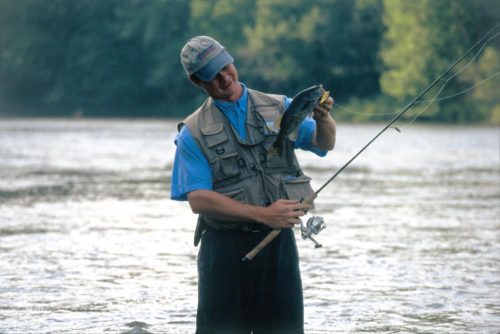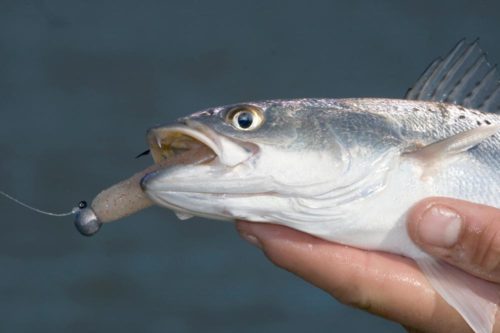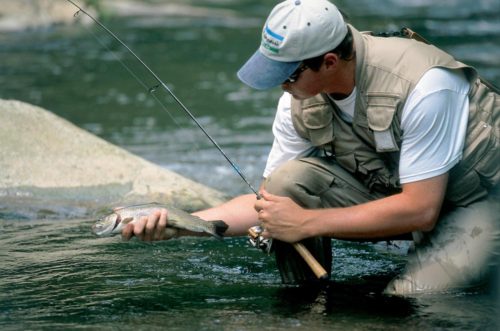When having a tough day fishing, it is common for anglers to assume that they were outsmarted by the fish. Is that really possible? Sure there are times when you know the fish are there, but you just can’t get them to bite. Does that indicate that fish are intelligent? What is the IQ of a fish?
These are difficult questions to answer. There have been many studies on the intelligence of fish. There are many factors to consider, and different ways of measuring intelligence. Lets take a look at some of the information from various studies and how it relates to angling.
Fish Brain
One debatable method for judging the intelligence of an animal is the size of its brain relative to its body. In this test, fish vary greatly. So much that different fish species have both the largest and smallest brain sizes relative to their bodies. The elephantnose fish has the largest brain compared to its body size of all known vertebrates. Conversely, the bony-eared assfish has the smallest brain compared to its body size. This measurement demonstrates the immense variability between different fish species. The are almost 28,000 known fish species, which leaves a lot of room for variety and different levels of intelligence.
Memory
Memory is a key component of intelligence. It allows for conditioning and learning to happen. Without it, an animal cannot learn much beyond its basic instincts. There have been many studies to test the memory capabilities of fish. As expected, their memory varies between species. Studies in mazes show that fish have spatial memory and navigate by remembered landmarks. A study with channel catfish showed that they could remember a human voice announcing food up to five years after last hearing it.
Fish memory has a great impact for anglers. Studies with carp have proven that they do become more difficult to catch after being caught once. Since fish can remember being caught, they can learn to associate that stress with many different triggers. These triggers could be the lure that they were caught with, the noise of an electric motor, the sound of a sonar or the noise of an angler moving around in a boat. They can even relate the stress of being caught to a specific area, and avoid that area in the future.
This verifies what many anglers have already learned. Fish can become conditioned to avoid certain types of lures and colors. This is why new and unique lures will often outproduce common ones in pressured waters. It also helps to keep the tackle industry alive, as anglers constantly require something new in order to continue to be successful.
Genetics
As previously mentioned, there is a great degree of variability between fish species. Most anglers are aware that some species can be more difficult to catch than others. For example, trout have good eyesight to help them spot and identify the insects that they prey upon. This is why anglers go to such great lengths to make realistic flies that look almost identical to the real thing. However, there is also variation in intelligence and behavior within any given species. Just like with humans, some individual fish are just smarter than others.
The intelligence and catch-ability of individual fish has been proven to be passed genetically to offspring. This has a very interesting affect for anglers. While not proven, it is possible that anglers harvesting fish have been selectively breading them to be difficult to catch. If intelligent fish are less likely to be caught and consumed, then they will be able to reproduce more often. This allows the intelligent fish to send more of their smart genes down through the next generation of fish.
If there is a chance that smarter fish could be bred, then it stands to reason that the same could be done for less intelligent fish. Dr. Gary Garrett tested this theory at the Hills Research Station in Texas. He showed that breeding two northern strain largemouth bass that were aggressive and easy to catch would produce offspring that were also aggressive. This concept was taken to fruition by Don Keller and Barry Smith at American Sport Fish in Montgomery, Alabama. They selectively bred northern strain largemouth bass for aggression over fifteen years. They called this new hyper aggressive breed “Gorilla Bass.”
Conclusions
The IQ of fish varies greatly depending on the species. It varies even further depending on individuals within any given species. Anglers need to look at the species that they are targeting for known traits and advantages that could make them more difficult to catch.
Fish can learn to avoid specific lures and noises made by anglers. In order to continue to be successful, anglers need to try new lures and colors on a regular basis. An effort should also be made to fish new areas and to make as little noise as possible.
Fish intelligence is hereditary and they can be bred to be easier to catch. Anglers should care take when harvesting fish in order to avoid selectively breeding intelligence. Smaller fish, whether intelligent or not, haven’t had the chance to learn to avoid lures. Therefore, they make a better choice for harvesting.
Whether you are catching fish or not, it is unlikely that they are outsmarting you. Their intelligence is very limited. You just need to work around what they may have learned.


